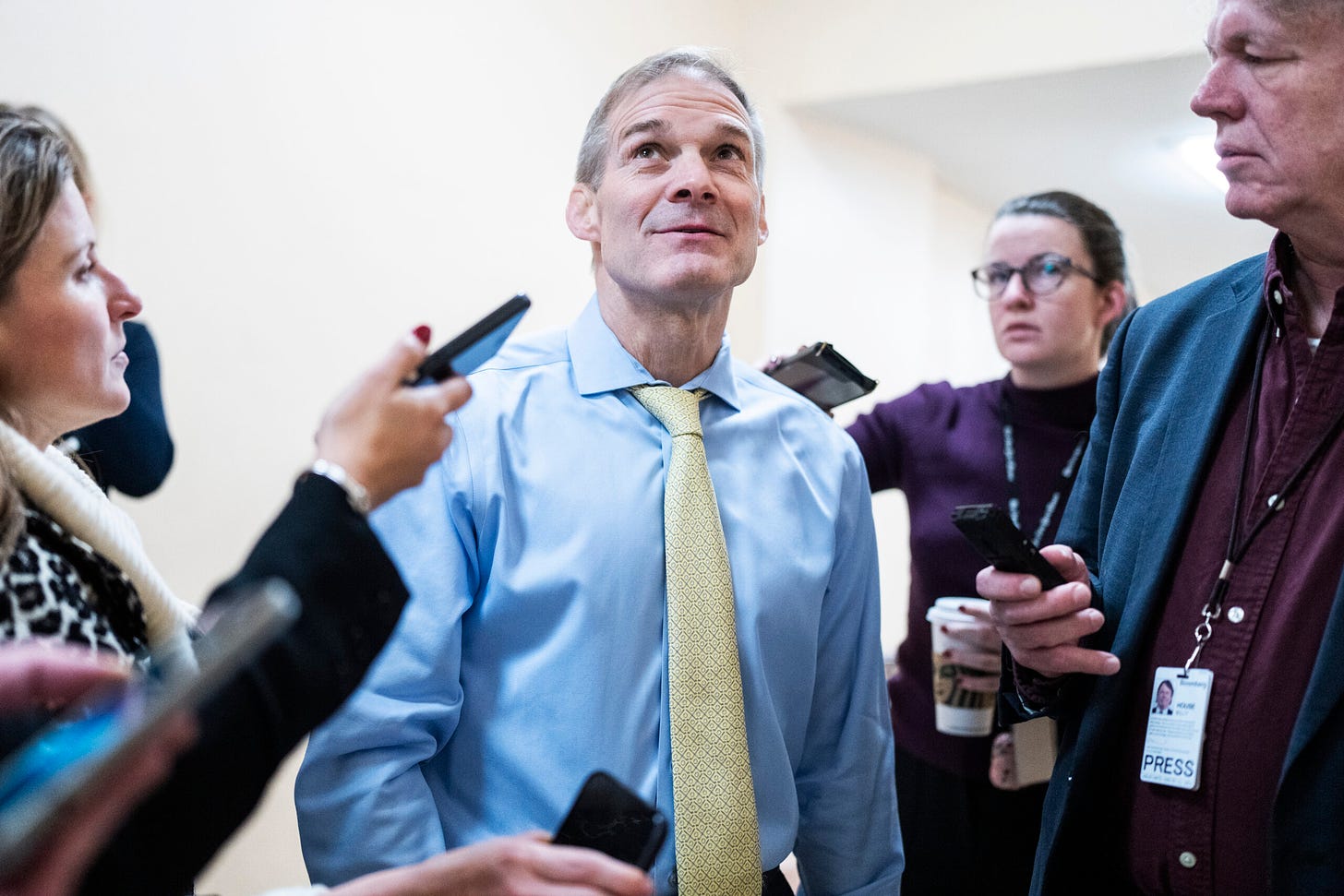
Jim Jordan, Church Committee Pretender
His new panel on the “weaponization of the federal government” bears no resemblance to the storied 1970s committee whose work led to intelligence reform.

Members of the new Republican majority in the House of Representatives are trying to stick a civil libertarian label on the subcommittee they’re creating to “investigate the investigators.” Its formal name will be the Select Subcommittee on the Weaponization of the Federal Government. But when talking about it to the press, some Republicans have taken to calling it a reincarnated “Church committee.”
They are invoking the 1975-76 Senate Select Committee on Intelligence Activities chaired by Sen. Frank Church (D-Idaho). That committee was launched after a bombshell 1974 New York Times report about Nixon-era CIA domestic surveillance on anti-war activists and other dissident American citizens.
Two of us (Johnson and Baron) served in key staff positions on the Church committee. The comparison is preposterous. The new House subcommittee is not remotely up to the Church committee standard—in origin, composition, or purpose.
To begin with, the Church committee bore serious moral authority, which arose from its truly bipartisan mission: tough-minded rethinking of intelligence agency activities under administrations of both parties stretching back almost twenty years.
Indispensable to its credibility was the energetic participation of steely moderate Republican senators like Howard Baker (R-Tenn.), Charles Mathias (R-Md.), and Richard Schweiker (R-Penn.). These were statesmen—intellectually honest and adept. In particular, Baker performed an indispensable, fair-minded role for Church committee Republicans, as he had done on the Senate Watergate Committee.
One example: Concerned about the Church committee’s probe into FBI activities against Martin Luther King Jr., Baker sought evenhandedness without obstruction. “Let’s have a balance, not just focus on King,” Baker said. “Perhaps a session on FBI infiltration of the KKK, too.”
On the Church committee, GOP senators—including the committee’s vice chairman, the conservative John Tower (R-Texas)—were willing to pursue the truth about the actions of Republican administrations. In turn, Democratic senators, including Church, Walter Mondale (D-Minn.), and Gary Hart (D-Col.), were willing to probe the actions of the Kennedy and Johnson administrations. That commitment to nonpartisan inquiry catalyzed the committee’s powerful, evidence-based critique of intelligence agency misconduct, and serious proposals for agency reforms later adopted in the Ford and Carter administrations.
The Church committee unearthed dramatic breaches of law and American norms:
CIA assassination plots against foreign leaders such as Fidel Castro in Cuba and Patrice Lumumba in the Congo.
FBI COINTELPRO surveillance, infiltration, and disruption targeting King, his Southern Christian Leadership Conference, and the anti-Vietnam War movement.
CIA and FBI mail-opening programs that snooped on broad swaths of U.S. citizens.
Those legitimate subjects of investigation are a far cry from what the new House subcommittee is setting out to do: fishing for stories about the mythical deep state and looking into “ongoing criminal investigations”—that is, going after the law enforcement officials investigating the January 6th insurrection.
The contrast with the Church committee is even sharper with the news that the subcommittee will be chaired by Rep. Jim Jordan (R-Ohio), who is also the chairman of the full Judiciary Committee of which the new panel is a part.
Jordan’s telephone calls with former President Donald Trump and his chief of staff, Mark Meadows—before and during the insurrection—make Jordan, at minimum, a witness in the Department of Justice investigation being led by Special Counsel Jack Smith.
So too are some other Republican hardliners—like Rep. Scott Perry (R-Penn.), who has insisted on his eligibility for an appointment to Jordan’s subcommittee. Perry joined Rep. Matt Gaetz in caucusing regularly during last week’s speakership fight at the offices of Meadows, who may well also be a subject or target of the special counsel’s investigation.
Jordan now denies any intent to probe the DOJ “ongoing criminal investigation” into January 6th. But freshman Rep. Daniel Goldman (D-N.Y.), a former federal prosecutor, is skeptical. “The primary purpose of this special subcommittee,” he said, “is to interfere with the special counsel’s ongoing investigation.”
As the New York Times has described it, the appearance of a historic conflict of interest is inescapable: “Lawmakers trying to scrutinize a Justice Department investigation as that inquiry potentially examines some of those same lawmakers’ conduct.”
More apt as a precedent for Jim Jordan’s new “weaponization” subcommittee is the 1954 congressional inquisition in which the demagogic Republican Joseph McCarthy accused the U.S. Army of secretly harboring Communists. During those hearings, McCarthy and his chief counsel Roy Cohn—Trump’s mentor—sought personal benefits through their investigatory power. Army Secretary Robert T. Stevens testified that he had been subjected to “persistent, tireless” efforts by McCarthy and Cohn to give preferential treatment to a personal associate of Cohn—with Cohn reportedly threatening to “wreck the Army,” and see that Stevens was “through” as secretary.
Such impropriety is even more pronounced here. The current congressional vendetta appears self-protective and intended to intimidate federal investigators from doing their jobs. Democracy is truly endangered by turning investigations partisan and disempowering the FBI at a time of rising domestic terrorism and foreign threats to undermine our government.
The good news: Attorney General Merrick Garland will undoubtedly refuse to cooperate with congressional invasions of the separation of powers, just as his predecessors, Robert H. Jackson and William French Smith, did in administrations of both parties. Legislative requests for information about ongoing DOJ investigations can hijack them by providing the targets, midstream, with traditionally confidential information.
Jim Jordan’s “weaponization” subcommittee bears no likeness to the Church committee. Jordan and company intend to generate headlines rather than needed reforms. They seek not to expose wrongdoers but to deflect attention from them. And instead of leaving a legacy of bipartisan honor and truth-seeking, their work will be remembered as a scandalous exercise in personal and partisan self-preservation.













